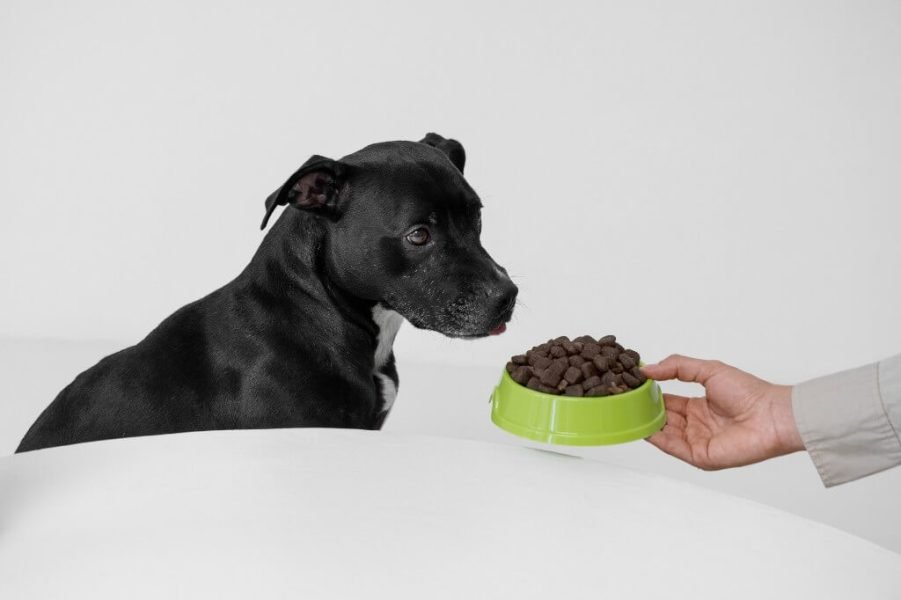Is Grain Free Food Good for Dogs? Unveiling the Truth!
Table of Contents
ToggleGrain free dog food can be beneficial for dogs with specific grain allergies or intolerances. It’s not necessary for all dogs, as grains can be a healthy part of a canine diet.

Choosing the right diet for your furry companion is crucial for their overall health and wellbeing. Grain-free food has become increasingly popular among pet owners, especially for those whose dogs suffer from grain-related issues. It’s important to understand that while some dogs thrive on a grain-free diet, others might miss out on certain nutrients found in grains.
Every dog is unique, so what works for one can vary for another. A diet free from grains may suit dogs with food sensitivities, but it’s essential to ensure they still receive a balanced intake of all necessary nutrients. Consultation with a vet is the best way to decide if grain-free food aligns with your dog’s dietary needs.
Benefits Of Grain Free Dog Food
Many pet owners are discovering the advantages of grain-free diets for dogs. Grain-free dog food can lead to several health benefits. Let’s explore these benefits more closely.
Improved Digestion
Digestive health is crucial for your furry friend. Grain-free formulas often use highly digestible carbs like sweet potatoes. This results in easier digestion for dogs. Fewer grains can mean fewer stomach upsets and a happier pooch.
Reduced Allergies And Sensitivities
Grains may trigger allergic reactions in some dogs. Grain-free food eliminates these common irritants. It can lead to reduced itching and better skin health. Dogs with grain sensitivities often benefit from a grain-free diet.
Increased Energy And Vitality
Higher protein levels in grain-free foods can boost your dog’s energy. This supports an active and playful lifestyle. A balanced diet full of nutritious ingredients contributes to overall vitality. Dogs may also display a shinier coat and clearer eyes.
- Easier digestion means a happier dog
- Fewer allergies will keep your dog comfortable
- More energy for play and exercise
Considerations When Choosing Grain Free Food
Dog owners often wonder if grain free food suits their furry friends. While some dogs may benefit from a grain-free diet, particularly those with allergies or sensitivities, it’s vital to choose the right product for your dog’s health needs. A careful assessment of the ingredients and nutritional content is crucial. Let’s delve into the critical factors to consider when selecting grain-free food for your dog.
Understanding Your Dog’s Dietary Needs
Dogs require a balanced diet to thrive. The ideal diet includes the right amounts of proteins, fats, carbohydrates, vitamins, and minerals. Even with grain free options, these nutritional needs must be met. It is essential to understand the specific health requirements of your dog based on breed, age, activity level, and any existing health conditions.

- Active breeds might need more calories.
- Senior dogs often require fewer carbohydrates.
- Protein is crucial for growth and repair.
Reading And Understanding Ingredient Labels
The ingredients on dog food labels are listed in descending order of weight. High-quality grain free foods often start with whole meat or meat meal ingredients. However, it’s crucial to identify the types of fillers that replace grains.
Look for these red flags on labels:
Ingredient | Consideration |
By-products | Low-quality protein sources |
Rendered fats | Possible toxins and lower nutritional value |
Artificial preservatives | Health risks and allergies |
Sweeteners | Unnecessary and can lead to weight gain |
While artificial colorants or flavor enhancers might make the food more appealing to your dog, they offer no nutritional benefit and could cause harm. Instead, opt for foods where natural ingredients provide flavor and nutrients.
Potential Drawbacks Of Grain Free Food
Grain-free diets for dogs often sound healthier, but they come with concerns. Understanding the potential drawbacks helps you make informed choices for your pet. Let’s explore the less-talked-about side of grain-free dog food.
Risk Of Nutritional Deficiencies
Grains offer vitamins and minerals important for your dog’s health. Without them, your dog might miss out on these vital nutrients. Grain-free foods sometimes lack in:
- Fiber: Aids in digestion.
- Vitamin E: Boosts the immune system.
- Magnesium: supports muscle and bone health.
Balance is key in a dog’s diet. Check with a vet to ensure your dog gets all it needs.
Higher Cost
Grain-free foods can hurt your wallet more. They often cost more than grain-inclusive diets. This price increase happens because grain-free options usually use pricier ingredients.
Grain-Free Dog Food | Traditional Dog Food |
More expensive protein sources | Cost-effective grains |
Complex manufacturing | Simpler processes |
Limited Availability
Not all stores stock a wide range of grain-free foods. They may be harder to find, especially in smaller pet stores or general supermarkets.
Online shopping offers more options, but it comes with wait times and shipping costs.
Frequently Asked Questions For Is Grain Free Food Good For Dogs
What Are Grain Free Dog Food Benefits?
Grain free dog food may benefit dogs with allergies or intolerances to grains. It can also offer a higher protein content and is oftentimes easier for certain dogs to digest. Owners may notice improved coat health and energy levels.
Do vets recommend Grain dog food?
Some vets may recommend grain-free food for specific health issues like allergies. However, it’s not universally recommended for all dogs. It’s important to consult with a vet to determine if it’s suitable for your dog’s individual needs and dietary requirements.
Is Grain Free Food Safe For All Dogs?
Grain free food can be safe for most dogs, but it is not ideal for all. Some dogs may develop deficiencies or heart conditions if not supplemented correctly. Always choose a balanced diet formulated to meet veterinary standards.
Can Grain diets cause health issues?
Recent studies suggest a possible link between grain free diets and dilated cardiomyopathy (DCM) in dogs. It’s crucial to ensure that a grain-free diet is well-balanced with appropriate nutrients to prevent such health issues.
Conclusion
Deciding on grain-free food for your dog is nuanced. Veterinary advice should be paramount, considering individual health needs. Nutrient balance is critical, so choose wisely. Remember, a happy dog stems from proper care and diet. Keep tailoring your furry friend’s meals for their best life.




Pingback: Cold Pressed Dog Food: Unleash Your Pup's Vitality!
Pingback: How Big Does a Mini Goldendoodle Get : Unveiling the Ultimate Size Potential
Pingback: How Much is a Sugar Glider? Unraveling the Mystery
Pingback: Harry Potter Hotel London: Experience the Magic of a Quirky Wizard-Themed Stay